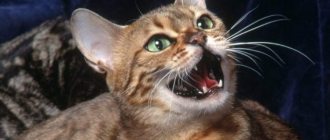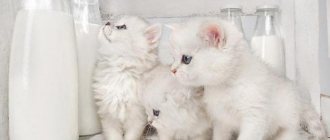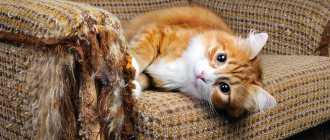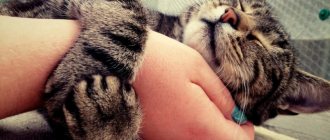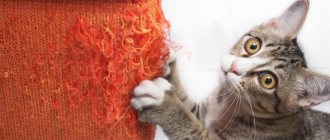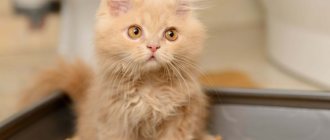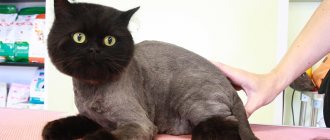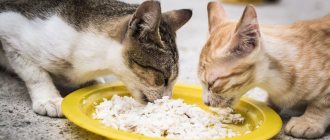Why can a cat still have a sucking reflex?
The main reasons why a cat retains the sucking reflex include:
- If the kitten was separated from the mother cat early .
- If the pet doesn’t get enough attention and affection from the owner . This desire especially appears in the animal during the period of adaptation and socialization. At this moment, he needs to create optimal conditions for the development and acceptance of new circumstances, and get rid of possible stressful situations. It is recommended to purchase interactive toys that allow you to entertain your pet in the absence of the owner.
- Sometimes animals are simply bored and, from banal idleness, begin to exhibit a sucking reflex.
- There may be a genetic or breed predisposition of the cat to such an activity. In this case, we consider Siamese and Persian cat breeds, including their admixtures. It is these pets that often chew and suck various things and objects.
- Severe stress or constant anxiety , emotional overstrain also affect the manifestation of the sucking reflex.
- Often, veterinarians note behavioral disorders that lead to a cat's desire to suck things or other objects.
- If the kitten is bottle-fed and is underfed . The animal tries to get food on its own. Can suck on woolen things that remind him of his mother. This activity is harmful, since hairballs clog his stomach and can cause gastrointestinal problems.
- As an option, systemic functional failures in the animal’s body.
How to save wallpaper and furniture?
In order for the wallpaper and furniture to remain intact, it is advisable to initially purchase a well-bred kitten, who will be at least 4 months old. This can be found at a breeder, where he lived with his mother cat and she managed to instill in him all the norms of behavior. Otherwise, before you wean your kitten from scratching wallpaper and furniture, you should be patient, persistent and learn to show only affection towards him.
There may be several reasons for this behavior:
- fight for territory - this happens when several animals live in an apartment;
- territory mark - if your neighbors also keep a cat in their house, the smell of which your kitten can smell from behind the door;
- stress – moving, new residents, including a small child;
- the kitten is too playful and does not know where to sharpen its claws, and the wallpaper and furniture are right under its nose, tempting them with scuffs and torn places.
Fixing the problem
How to wean a cat
It is recommended to separate kittens from their mother when she is ready for this. Most often this happens during teething in babies. She will become irritable and hide from the children.
To distract kittens older than three months from their mother, you can:
- distract with interesting games . Buy noisy toys, or those that have the smell of some kind of delicacy;
- During the process of weaning from the mother kittens cannot be rehoused ; it is better to buy a new nest for the cat. The kids will already be nervous, and you will also take away their shelter;
- If the cat has become accustomed to sucking your things, you should not leave them in a visible place. Always hide them in a closet or other place inaccessible to your pet. After some time of absence of the object of desire, the animal must forget about its idea;
- If the cat prefers to suck parts of the human body: his ears and fingers, it is recommended to proceed gradually. If these are fingers, it is better to let the animal suck only one of your fingers. Others cannot be given. Then put on a leather glove that you don't mind.
- You can try coating the item with citrus juice or black pepper . But if this does not help, it is better to choose another option. Such actions do not have a positive effect on the pet. And in our case, a peaceful solution to problems is the best option.
You can try coating the item with pepper or citrus juice.
Animal psychologists say that kittens who received moral trauma in childhood can continue the sucking reflex for up to three years. And it is almost impossible to get rid of this.
When you accustom him to the glove and arrange your pet’s own shelter, be sure to put that same glove inside. Moreover, washing it is strictly prohibited. Over time, the problem will resolve itself.
Kitten chews wires
In fact, cats quite rarely start chewing wires, but if such a habit does appear, then the animal must be weaned from it as soon as possible. Firstly, this threatens the health and possibly the life of the pet itself, and secondly, damage to wiring and electrical devices is possible.
Let's figure out how to stop a kitten from chewing wires.
Remember that it is necessary to raise kittens only using humane methods. Aggression on your part will only worsen the situation and completely destroy the mutual understanding between you and your pet.
All habits are formed in a pet from childhood, so if you do not immediately wean it from bad behavior, then it will be impossible to retrain an adult animal.
A kitten fills the house with comfort, because it’s so nice when a good-natured, gentle creature greets you on the doorstep. But not all pets are gentle; some love to bite and scratch their owners. This happens because the baby does not know how to behave with people, so you should not blame him for his bad character. Let's figure out how to stop a kitten from scratching.
- Perhaps the baby is just scared; you brought him to a new home, play with him and pet him, and such attention is not only unusual for him, but frightening. So he starts scratching and biting. What should you do? The cause of fear must be eliminated. The kitten should be left alone for a while so that it gets used to the new conditions. And when he realizes that there is no reason to be afraid, he will stop behaving badly.
Some kittens bite too hard when they get angry. They don't want to hurt their owners, but they just don't understand that they shouldn't do that.
Remember the main thing, the kitten is a living creature, and you are responsible for it. Therefore, do not offend or beat your pet, be patient and establish contact with him, this will be the key to your tender relationship with your pet.
In this case, which can be thrown or dragged on a string. This will help satisfy the animal instinct, and your hands will remain unscratched.
When a cat bites you, you should try not to jerk your hand away sharply, since this is what prey does when trying to escape. On the contrary, try to bring your hand closer to the cat, this will confuse it and it will let you go.
A pet may exhibit an instinct associated with violating personal territory. Another animal may be to blame. For example, a bird cage may irritate your kitten, causing him to bite and scratch. In this case, you should not keep the irritant in the same room as the kitten.
Many owners are touched when their furballs attack them. Time passes, and the adult pet repeats the same actions. Since previously such actions were not stopped, but, on the contrary, caused delight, the cat does not understand the reasons for the irritation on the part of the owner. If the cat attacks you, you can lightly spray it with water from a spray bottle. It is enough to repeat this attempt several times and this will wean the cat from rushing at you.
Cats have a very sensitive sense of smell, so some smells can irritate them, and this can cause aggression.
When a kitten scratches, you can clap your hands hard. Strong and unexpected sounds are a limiter for animals; they frighten them, and the pet understands that it is impossible to behave this way. For example, a cat may feel threatened by a foreign smell on your clothes and begin to defend its territory. For this case, you can buy a special spray at a pet store and treat some areas. This scent will help make your cat calmer and more peaceful.
Some cats become aggressive due to lack of exercise. When a cat sees nothing but an apartment, its owner can become an object for hunting. In this case, active games will help, or you can try to accustom her to a scratching post, so she will not only release excess energy, but also do a manicure.
The kitten should have its own place in the house
What not to do during the weaning process
There are things you shouldn't do to avoid harming your cat:
- It is often advised to splash water on your pet in the process of weaning off the sucking reflex. This cannot be done, because in this case you create an association in the animal with unpleasant sensations, but also provoke the appearance of fears. The cat may get scared and become very stressed. In addition, against the background of what is happening, real psychological trauma may appear that will accompany the animal throughout its life. It is even possible to have a phobia of water.
- You cannot scold the cat or make physical comments . There is a possibility that the animal will misunderstand you and will simply be afraid. And against the backdrop of stress, the desire to suck on things or objects will only increase.
- If the kitten is weaned from its mother's breast, you should not smear pepper or anything else on the nipples . This can have a detrimental effect on the female. It is better to consider other options for weaning. For example, gradually separate animals in different rooms for a while. Moreover, it is better to play with the little fidget at this time. You shouldn't leave it alone. Nothing good will come of this.
Weaning from a cat
In this article I will tell you why a cat may still have a sucking reflex. I will describe possible methods and give recommendations on how to wean an animal from the sucking reflex. I will dwell in detail on what not to do during the weaning process.
Before weaning kittens from a cat, it is necessary to understand what the process itself is. Weaning is the transition of babies from mother's milk to solid food. As a result, the kitten will become completely independent of her care and independent.
Weaning begins when the babies are 4 weeks old. For 1-1.5 months, they are taken every day for several hours to another room, which is pre-prepared: a tray and bowls of food and water are placed. Mom, of course, will constantly watch the kittens and “set an example.”
Weaning a kitten off its mother's milk is quite simple. So, for a while, you started moving the babies every day to another room where their food bowls are. Pour cat milk replacer into one of them and perform the following steps:
- dip your finger in milk;
- bring it to the baby’s nose, poke it lightly so that he understands what it is, and let him lick his finger;
- repeat the procedure again.
The kitten, having seen the source of food, should begin to lap it from the saucer.
In just a few days the baby will drink milk from a saucer on his own
While he is learning, the owner must continue to feed him with mother's milk. In this case, the kitten is first offered food from a bowl and only then taken to the cat. This sequence will help ease the weaning process.
How to wean a kitten from the sucking reflex
The sucking reflex is an innate skill of young mammals that ensures their normal functioning during infancy. As they grow older and switch to adult foods, this reflex usually weakens. However, some teenage kittens do not want to get out of childhood and continue to suckle the mother cat or persistently stick to the owner’s fingers, areas of his clothing or foreign objects. What is the reason for such atypical behavior in children? And can it be corrected?
Facts about the sucking reflex
Sucking is an indicator of the newborn's vitality and health, a method of nutrition, as well as the first experience of communication and knowledge of the world. According to zoologists:
- An active kitten, barely born, instinctively crawls to the warm mother's belly, independently finds the nipple and greedily sucks in the precious colostrum. Small and weakened babies suck poorly or are not able to suck at all, which indicates their low vitality and possible developmental defects.
- Sucking is not only the process of absorbing food, but also the establishment of a strong emotional connection with the mother, and the creation of the first psychological associations. While sucking, the kitten is in a state of peace and comfort and, having had enough, calmly falls asleep.
- The warmth of the native nest, licking by the mother's wet tongue, the smell of milk and its taste are included in the complex of first sensations of a baby kitten that has just begun its life's journey. The mother cat and littermates are the first creatures with which the baby interacts and communicates.
- Sucking contributes to the development of the kitten’s vestibular apparatus and coordination of movements: just observe what exotic positions the babies take in order to get to the life-giving source on the mother’s stomach. Subsequently, sucking skills are transformed into the ability to capture and hold prey in the mouth, as well as cut it up.
- Having opened its eyes and learned to walk, the kitten begins to more actively explore the world around it and does this with the help of its mouth and limbs. Having gently touched the paw pad and made sure that the object is safe, the baby will most likely want to taste it, trying to suck and chew at the same time.
Manifestation of the sucking reflex in older kittens
A mother cat usually feeds her offspring for up to 2-2.5 months.
Gradually, the amount of milk decreases, and, sensing this, the mother cat begins to wean her babies off the breast, running away, hiding and even growling at them. Accordingly, growing babies switch to eating adult food and soon completely forget about infant habits. However, you can also observe a picture of atypical behavior when a teenage kitten:
- continues to suck on the mother's empty nipples;
- persistently sucks the owner's fingers, earlobe, hair or fold of skin;
- spends a long time chewing, chewing and sucking on a plush toy or a corner of a fleecy woolen blanket;
- licks, chews, smacks and even swallows other inedible objects, for example, genuine leather products, drywall, scraps of wallpaper, cement chips, glued paper books.
Also watch the video on how to stop a cat from sucking:
Why does a teenage kitten continue to exhibit a sucking reflex?
Brain development in cubs is directly related to mouth movements, and the sucking reflex turns out to be a very important element of psychophysiological development. The reasons for a kitten’s prolonged suckling period may be:
- . ” When keeping a cat family together, the nurse cat with a developed maternal instinct turns out to be too caring, meekly enduring the attack of energetic teenagers and the unpleasant grabbing of the nipples by toothy mouths. Sometimes a selfless mother continues to feed an over-aged child at the same time as the subsequent newborn offspring.
- Early weaning or artificial feeding . In this case, the suckling kitten considers a person to be the closest creature, associating with him not only the provision of food, but also a blessed feeling of security and tranquility. Falling asleep in the owner's bed, a well-fed and satisfied baby can begin to lick and smack any part of the owner's body. Cubs, accustomed to receiving food exclusively from human hands, will stick to their fingers when they feel hungry.
- Lack of attention on the part of the owner, frequent loneliness, boredom . Not finding a more suitable object to splash out its emotions, the kitten will cuddle and cling to a soft toy or fur item.
- Stress, nervous shock . Instinctive memory indicates that the safest place is next to the mother in her own den, so the fear experienced can psychologically turn a teenage kitten into a three-week-old sucker. Having disconnected from the scary outside world, the baby animal uses the sucking reflex as an effective antidepressant, relaxing with the help of a kind of “self-hypnosis.”
- Breed predisposition . It has been noticed that young Siamese, Thai, Persian, Asian cats, as well as their crosses, often suck and chew things.
- Underfeeding, lack of vitamins and minerals . Unbalanced feeding can lead to licking, chewing and swallowing of inedible objects. So, experimentally the body tries to compensate for the deficiency of certain ingredients. In particular, if there is a lack of minerals, the cat will choose the walls or taste the soil from flower pots. The desire to suck on woolen items is due to the content of lanolin in them, which has a similar chemical nature to lipids and fatty acids. Naturally, the habit of eating inedible objects has a detrimental effect on the cat’s body, causing clogging of the digestive tract and increasing the likelihood of poisoning.
- Disturbances in the functioning of organs and systems . Constant licking and sucking can provoke functional disruptions in the body, leading, for example, to increased salivation and nausea. In turn, this may be a sign of poisoning, internal intoxication, diseases of the oral cavity, teeth, and digestive tract. A persistent desire to lick a part of one’s own body may be associated with dermatitis, a manifestation of a skin allergy caused by a wound.
Why do kittens stick to objects?
If your cat is sucking on your hand, ear, or other things, the following may be the cause:
- Early weaning from breastfeeding mother's milk or mother cat.
- Lack of love and care from the owner. Kittens feel a particular shortage during adaptation and socialization. At this time, the owner will need to create the most comfortable conditions for the growth and development of the pet, and protect it from stress.
- Boredom. If a kitten is bored, it may begin to exhibit a sucking reflex.
- Hereditary or breed predisposition. When the kitten's parents had the same habits, with a high degree of probability they can be passed on to the small cat. In addition, representatives of the Persian and Siamese breeds are most susceptible to the sucking reflex.
- Constant stress.
- Diseases of the endocrine system and dental problems. In this situation, the presence of pathologies can only be determined by a veterinarian. If the owner of a kitten suspects the development of illnesses, you need to take the kitty to a veterinary clinic.
Often this habit is formed in children who are artificial.
Being on artificial feeding and underfeeding also causes the sucking reflex to appear. In this case, cats often try to get food for themselves on their own. Often the pet cuddles in woolen clothes, which remind him of his mother. It is important for the owner to force the cat to get rid of this habit as soon as possible, since hairballs get stuck in the stomach and cause problems with the digestive system. In addition, similar behavior can be observed when there is a lack of vitamins in the body.
How to wean a kitten from sucking?
Like human babies, baby kittens, during the first time after separation from their mother, taste objects that interest them.
Normally, the sucking reflex disappears by 5 months of age.
For the correct formation of behavioral stereotypes, it is important:
- kitten feeding regimen;
- food offered to kittens;
- maternal separation program;
- psychological atmosphere and stress experienced.
Owner actions. As active measures for weaning tailed babies from the mother's breast and fostering independence, felinology recommends:
- Letting 3-week-old babies taste soaked dry food or beef scraper from their fingers, gradually teach them to eat from bowls, breaking the “fingers-food” association. In addition, babies receiving high-calorie complementary foods suckle their mother cat much less.
- Starting from 1.5 months, the kittens are isolated from the mother cat for 1-2 hours every day, closing them in the next room. For a variety of leisure activities, the “children’s room” includes a dining room, multi-level shelter houses and a playground. At the same time, to occupy the attention of children, they use various toys and treats.
- To re-educate particularly stubborn suckers, it is necessary to put a special blanket on the mother cat that covers the nipples. It is not recommended to use any ointments or products for treating the mammary glands and chemically repelling kittens due to the possibility of poisoning both the cat itself and the cubs when licking.
- The minimum age for separation from the mother is 2 months. If the baby came to a new family earlier, then in order to alleviate stress and feelings of loneliness, the owner must surround him with increased attention and care. Monitoring your pet's behavior will help you correct negative habits in time. If you notice an increased urge to suck, it is recommended to hide soft toys and replace them with elastic silicone balls, teasers with feathers and interactive toys that develop the baby’s hunting instinct to attack and grab “prey.”
- After 2 months, kittens are completely transferred to solid food, replacing soaked dry food and pates with whole granules or pieces of frozen raw meat. This is how the young animals get used to working with their jaws, reproducing chewing movements instead of sucking ones. Cats are fed exclusively from bowls.
- If a persistent habit of clinging to things or gnawing on inedible objects is detected, the pet’s diet is analyzed - perhaps this is a signal of a lack of certain food ingredients. To eliminate this, it is recommended to use high-quality super-premium and premium dry kitten food.
- An obsessive sucking reflex, combined with other signs of illness in a growing kitten, is a reason for a visit to the veterinarian. Perhaps then hidden diseases and developmental pathologies will be discovered.
- If an over-aged suckler is healthy, then the owner can show severity, expressing his disapproval and scaring off the stubborn one during an unwanted action. A stream of water from a spray bottle, clapping your hands, or the sound of a falling book will shift your attention and distract you from the obsessive process.
- The situation when a kitten chews and gnaws on the owner’s things requires measures to change the senses of taste and smell. To do this, items are treated with essential oils of mint, citrus fruits or coniferous plants, sprayed with a solution of lemon juice, vinegar, garlic water, or use special anti-gnaw sprays purchased at a pet store.
How to wean kittens from a cat and stop lactation
15.01.2018
Update: April 2019
To properly wean kittens from your cat, you need to do this gradually. It is better to start weaning babies from mother's milk at 4 weeks. From this period, they begin to gradually introduce “adult” food, thereby teaching them to lap up liquids and chew solid food. A complete transition to adult food and cessation of breastfeeding is noted by 8-10 weeks.
You should not separate kittens from your cat too early (before 4 weeks) or too abruptly. You should wait until you acquire the basic skills to live independently and eat food other than mother's milk.
The guideline for introducing solid food should be the opening of the eyes, standing firmly on the paws and the eruption of the first teeth - babies should be able to focus their eyes on the food, confidently approach it and try to chew.
After the kittens reach 4 weeks of age, they need to be taken away from the nursing mother for 2-3 hours to a separate room where a toilet, water and food are provided. The first few days, take it for one interval of 2-3 hours, then twice a day. As the kittens grow older, they will be able to stay on their own without their mother cat for longer and longer periods of time.
It is better to provide a special milk formula for kittens as food during weaning hours. Giving cow's milk is not recommended due to frequent cases of indigestion, diarrhea or constipation.
It is strictly not recommended to put a kitten's face in a saucer with formula/milk - the baby may inadvertently inhale droplets of liquid and develop pneumonia.
The owner should dip a finger into the liquid and touch the kitten's lips with it. The kitten must lick itself. Repeat the procedure until he begins to lick milk directly from his finger. Then dip your finger in the saucer and hold it there until the kitten comes to the saucer and starts lapping up the milk right from there next to the finger.
They begin to offer solid food only after babies confidently begin to drink from a saucer. You can offer special balanced food for kittens or make a paste with the consistency of oatmeal from crushed dry food and milk (infant formula).
You should bring a finger lubricated with gruel to the kitten’s lips and give him the opportunity to sniff the food. Then you should smear the lips, lightly pushing the food into the mouth. Wait until the kitten tastes, chews and licks.
After the kittens begin to fully eat only “adult” food, go to the toilet in a tray and can do without the cat’s mother for a long time (age 10-12 weeks), then the offspring can be distributed into the wrong hands.
There is usually no need to interfere with the cat's completion of milk production. If you wean kittens correctly and put the cat on the right diet, everything will happen naturally without any complications.
The ideal option is sequential weaning, when one kitten is weaned every 3-4 days. This way, lactation subsides gradually naturally, without complications or the use of medications. During this period, the mustachioed predator is transferred to a special diet.
If there is a need to wean all the kittens at once, then 2-3 days before the expected event the cat is given a sedative, because This will be a huge stress for the animal. Usually prescribed:
- Kot Bayun solution: 5-7 days 3-4 times a day, 2 ml per dose;
- Kot Bayun tablets: 1-2 tablets per week. up to 4 doses per day 45 minutes - 1 hour after eating food or 25 minutes before;
- Fitex: 3-5 drops up to 3 times a day for 2-4 weeks.
Cat food
Two to three days before the kittens are weaned, the cat needs to reduce the amount of liquid and protein food consumed. Drink strictly after meals (without further free access to water) and exclude dairy products, fish and meat from the diet.
During this period, it is good to feed with special foods with a reduced protein content, vegetable soups and cereals (it is better to give preference to buckwheat).
The cat should be kept on this diet until the last kitten is weaned, plus another 2-3 days, depending on how the pet is feeling.
You need to keep your cat on diet feeding until the milk from the mammary glands completely disappears (the nipples are soft; nothing comes out of them when you try to express).
If absolutely necessary, you can stop a cat's lactation using special medications. Galastop (a drug for dogs, but successfully used for cats) or Mastomethrin.
These products allow you to gently suppress lactation, minimizing the risk of mastitis.
Both drugs (optional) begin to be taken when all kittens have been weaned from the nursing mother, and within 24 hours malaise, hardening of the mammary gland, and an increase in temperature (local or general) have appeared. Courses – 5 days. Dosage:
- Galastop: 0.1 ml (or 3 drops)/kg body weight orally once a day (can be given with food, water or simply dripped onto the tongue);
- Mastomethrin: 0.1 ml/kg body weight injected under the skin at the withers or into the thigh muscle (maximum 4 ml) 1-2 times a day.
The drugs have side effects such as nausea and vomiting, but this is not a reason to stop therapy.
What causes the sucking reflex in kittens?
The mother’s ability to suckle is an unconditioned reflex that ensures the vital functions of the body. A newborn kitten, who can only squeak and suck, chooses its mother's nipple. She grabs it into her mouth, strokes it with her tongue, moves her paws over the mother’s belly, stimulating lactation, and defends the right to food, pushing away her sisters and brothers.
Although the eyes and ears are closed, the sense of smell and touch works:
- the nipple is located by smell;
- body position is adjusted using thermoregulation and tactile receptors.
Important. The first teeth appear from the 12th day; feeding with raw meat is allowed from 3-4 weeks of age. It is cut into thin strips, “worms”, which the kitten swallows with a sucking movement - it cannot chew yet.
A cat in the village or a wild one brings mice, independently accustoming the cubs to solid food. The transition to a normal diet for the species lasts up to 6 months.
People acquire month-old sucklers, sometimes a little older than a month. The transition to food that is convenient for the owner is abrupt; in this case, the sucking reflex does not subside, but this is the most favorable time to wean the kitten from sucking.
What is prohibited?
Some pet breeders recommend teaching kittens to fight the habit by spraying water on them. It is not recommended to use this method, as in this situation the pet may develop serious fears. In addition, a phobia of water often develops, which significantly complicates the existence of both the kitten and its owner. In this case, there can be no talk of any water procedures.
It is forbidden to scold a pet, much less beat it. The cat may misunderstand the owner and become afraid of him. The resulting stress will make the desire to suck objects even stronger. If you need to wean your baby off a female's breast, you may come across advice about spreading pepper or citrus juice on your cat's nipples. Doing this is strictly prohibited, since such manipulation can cause serious complications for both the kitten’s body and its mother. In such a situation, you will need to act in a different way and begin to temporarily separate the cats in different rooms. In this case, it is better to keep the baby busy with games. It is not recommended to leave your pet alone so that the sucking reflex does not switch to other objects.
Sources:
https://porodakoshki.ru/kak-otuchit-kotenka-ot-sosaniya-koshki/ https://koshkovod.ru/kak-otuchit-kotenka-ot-sosatelnogo-refleksa-i-sosat-odeyalo https://infokotiki .ru/soderzhanie/nvr/kak-otuchit-kotenka-ot-sosatelnogo-refleksa.html
Why does a cat suck a blanket, blanket, tail or paw?
Owners don’t think about how to wean a cat from sucking a blanket if every morning the pet has a happy face:
- jumps on the bed;
- paws;
- purrs with pleasure.
This behavior is a sign of trust and love between the pet and its owner. Sucking on a blanket saturated with the scent of a person of the highest rank in the family is a recognition of strength and, at the same time, one’s own safety.
If the cat sucks on blankets and other bedding not in the morning, there are several reasons:
- Impaired metabolism.
- Stressful situation (sucking calms).
- The kitten is teething.
- The sucking reflex has not faded in a baby or an already mature cat.
Sucking a tail or paw should alert the owner : perhaps the cat is trying to pull out a splinter. If, when you carefully feel the paw, the cat withdraws the limb, you will need the help of a veterinarian. If no pain is observed, he may have been taken away from his mother early or he is experiencing severe stress.
What to do?
Veterinarians recommend weaning a kitten from sucking a cat at the moment when the pet is ready for it. Often, females stop feeding their offspring during teething. To distract your baby from his mother or from sucking other things, you need to buy interesting toys for him. Objects that make noisy sounds are perfect. Pet stores offer a wide selection of such toys, but they are easy to make yourself. In addition, experienced breeders recommend equipping various climbing frames and hammocks for the kitten. The owner can purchase a house for the cat or make it with his own hands. Such a sleeping place will also serve as an excellent refuge where the pet can be alone during times of stress.
At first, the owner can switch the pet’s attention to only one of his fingers.
If an adult cat prefers to suck on blankets, earlobes, or fingers, the owner will need to take a step-by-step approach. Veterinarians recommend allowing your cat to suck only one finger. Then you will need to use a glove made of natural material. When your pet switches to it, gets used to it and begins to consider it his property, he will no longer need to wear it. You will need to place the glove in the animal's house or bed. Despite the fact that the method is unusual, it is effective. Cats that suffered mental trauma in childhood can retain the sucking reflex even up to the age of three. An adult pet can bite through the owner's skin while sucking fingers.
If he is accustomed to the glove, the owner will not interfere with the natural process of weaning off the reflex. The animal will deal with moral trauma using its usual method.
How to cope with physiological problems?
It is important for the owner to understand why the sucking of things did not go away after feeding. If your kitten continues to cling to areas of the neck or blanket before bed, veterinarians recommend reviewing its diet. Some animals simply do not receive enough vitamins and microelements required for their body. In such a situation, cats should be given ready-made complementary foods, which are sold in stores. The owner will need to pay attention to premium and super-premium food segments, which are created for feeding babies. If you suspect a sucking reflex due to the development of pathologies in the body, you need to consult a veterinarian.
